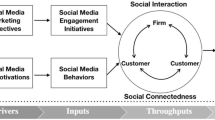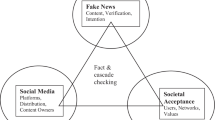Abstract
We theorize that social media will reduce the incidence of corporate greenwash. Drawing on the management literature on decoupling and the economic literature on information disclosure, we characterize specifically where this effect is likely to be most pronounced. We identify important differences between social media and traditional media, and present a theoretical framework for understanding greenwash in which corporate environmental communications may backfire if citizens and activists feel a company is engaging in excessive self-promotion. The framework allows us to draw out a series of propositions regarding the impact of social media on corporate decisions whether to greenwash, and what channels to use for environmental communication. We conclude with a number of suggestions for future research.
Similar content being viewed by others
Notes
Kaplan and Haenlein (2010, p. 61) define social media as ‘‘a group of Internet-based applications that build on the ideological and technological foundations of Web 2.0, and that allow the creation and exchange of user-generated content.’’ Thus, in order to avoid confusion with the literature on stakeholder media (Hunter et al. 2008) we focus on social media not as content creators but as channels through which actors can communicate content.
Lyon and Maxwell (2011) define reputation as follows. Let N be the number of prior environmental projects undertaken by the firm. If S of those were a success, then r = S/N denotes the firm’s reputation.
References
Aguinis, H., & Glavas, A. (2012). What we know and don’t know about corporate social responsibility: A review and research agenda’. Journal of Management, 38(4), 932–939.
Akerlof, George A. (1970). The market for lemons: Quality uncertainty and the market mechanism. The Quarterly Journal of Economics, 84, 488–500.
Al-Tuwaijri, S. A., Christensen, T. E., & Hughes, K. E. (2004). The relations among environmental disclosure, environmental performance, and economic performance: A simultaneous equations approach. Accounting, Organizations and Society, 29, 447–471.
Alves, I. (2009). Green spin everywhere: How greenwashing reveals the limits of the CSR paradigm. Journal of Global Change and Governance, I(1), 1–26.
Ashforth, B., & Gibbs, B. (1990). The double-edge of organizational legitimation. Organization Science, 1, 177–194.
Bansal, P., & Clelland, I. (2004). Talking trash: Legitimacy, impression management, and unsystemmatic risk in the context of the natural environment. Academy of Management Journal, 47(1), 93–103.
Beatty, T., & Shimshack, J. P. (2010). The impact of climate change information: New evidence from the stock market. The B.E. Journal of Economic Analysis and Policy, 10(1), 1Ā27.
Benkler, Y. (2006). The wealth of networks: How social production transforms markets and freedom. London: Yale University Press.
Boxenbaum, E., & Jonsson, S. (2008). Isomorphism, diffusion and decoupling. In R. Greenwood, R. Suddaby, C. Oliver, & K. Sahlin-Anderson (Eds.), Handbook of organizational institutionalism (pp. 78–98). Thousand Oaks, CA: Sage.
Bromley, P., & Powell, W. W. (2012). From smoke and mirrors to walking the talk: Decoupling in the contemporary world. The Academy of Management Annals, 6(1), 483–530.
Campbell, J. L. (2007). Why would corporations behave in socially responsible ways? An institutional theory of corporate social responsibility. Academy of Management Review, 32(3), 946–967.
Carroll, C. E. (2010). Should firms circumvent or work through the news media? Public Relations Review, 36(3), 278–280.
Carroll, C. E., & McCombs, M. E. (2003). Agenda-setting effects of business news on the public’s images and opinions about major corporations. Corporate Reputation Review, 6(1), 36–46.
Castello, I., & Lozano, J. M. (2011). Searching for new forms of legitimacy through corporate responsibility rhetoric. Journal of Business Ethics, 100, 11–29.
Clarkson, P. M., Li, Y., Richardson, G. D., & Vasvari, F. P. (2008). Revisiting the relation between environmental performance and environmental disclosure: An empirical analysis. Accounting, Organizations and Society, 33, 303–327.
Dasgupta, S., Laplante, B., & Mamingi, N. (2001). Pollution and capital markets in developing countries. Journal of Environmental Economics and Management, 42, 310–335.
Deephouse, D. D., & Suchman, M. (2008). Legitimacy in organizational institutionalism. In R. Greenwood, C. Oliver, K. Sahlin, & R. Suddaby (Eds.), The sage handbook of organizational institutionalism (pp. 49–77). Thousand Oaks, CA: Sage.
Delmas, M. A., & Montes-Sancho, M. J. (2010). Voluntary agreements to improve environmental quality: Symbolic and substantive cooperation. Strategic Management Journal, 31, 575–601.
DiMaggio, P. J., & Powell, W. W. (1983). The iron cage revisited: Institutional isomorphism and collective rationality in organizational fields’. American Sociological Review, 48, 147–160.
Du, S., Bhattacharya, C. B., & Sen, S. (2010). Maximizing business returns to corporate social responsibility (CSR): The role of CSR communication’. International Journal of Management Reviews, 12(1), 8–19.
Elsbach, K., & Sutton, R. I. (1992). Acquiring organizational legitimacy through illegitimate actions: A marriage of institutional and impression management theories. Academy of Management Journal, 35, 699–738.
Espeland, W. (1998). The struggle for water: politics, rationality, and identity in the American southwest. Chicago: University of Chicago Press.
Fieseler, C., Fleck, M., & Meckel, M. (2010). Corporate social responsibility in the blogosphere. Journal of Business Ethics, 91, 599–614.
Fisher-Vanden, K., & Thorburn, K. (2011). Voluntary corporate environmental initiatives and shareholder wealth. Journal of Environmental Economics and Management, 62(3), 430–445.
Fiss, P. C., & Zajac, E. J. (2006). The symbolic management of strategic change: Sense giving via framing and decoupling. Academy of Management Journal, 49(6), 1173–1193.
Frazier, M. (2008). Do people care about your ‘green’ message? Yes: Nielsen Report shows perils of exaggerating ecological good deeds!, Advertising Age, March 31, 2008. Retrieved June 2012, from http://adage.com/article/news/people-care-green-message/126067/.
George, E., Chattopadhyay, P., & Sitkin, S. B. (2006). Cognitive underpinnings of institutional persistence and change. Academy of Management Review, 31, 347–365.
Grunig, J. E., & Hunt, T. (1984). Managing Public Relations. Fort Worth, TX: Harcourt Brace Jovanovich College Publishers.
Harbaugh, R., Maxwell, J. W., & Rousillon, B. (2011). Label confusion: The groucho effect of uncertain standards. Management Science, 57, 1512–1527.
Hunter, M. L., Le Menestrel, M., & de Bettignies, H.-C. (2008). Beyond control: Crisis strategies and stakeholder media in the Danone boycott of 2001. Corporate Reputation Review, 11, 335–350.
Jacobs, B. W., Singhal, V. R., & Subramanian, R. (2010). An empirical investigation of environmental performance and the market value of the firm. Journal of Operations Management, 28, 430–441.
Kaplan, A. M., & Haenlein, M. (2010). Users of the world, unite! The challenges and opportunities of social media, Business Horizons, 53, 59–68.
Kent, M. L., & Taylor, M. (2002). Toward a dialogic theory of public relations. Public Relations Review, 28, 21–37.
Kim, E.-H., & Lyon, T. P. (2011). When does institutional activism increase shareholder value?: The carbon disclosure project. The B.E. Journal of Economic Analysis and Policy, 11(1), 50.
King, M. D., & Haveman, H. A. (2008). Antislavery in America: The press, the pulpit, and the rise of antislavery societies. Administrative Science Quarterly, 53, 492–528.
King, A. A., & Lenox, M. J. (2001). Does it really pay to be green? An empirical study of firm environmental and financial performance. Journal of Industrial Ecology, 5, 101–116.
Klassen, R. D., & McLaughlin, C. (1996). The impact of environmental management on firm performance. Management Science, 42, 1199–1214.
Laufer, W. S. (2003). Social accountability and corporate greenwashing. Journal of Business Ethics, 43, 253–261.
Lyon, T., & Maxwell, J. (2011). ‘Greenwash: Corporate environmental disclosure under threat of audit. Journal of Economics and Management Strategy, 20, 3–41.
Lyon T. & Shimshack J. (2012). Environmental Disclosure: Evidence from Newsweek’s Green Companies Rankings. Business and Society, published online before print August 13, 2012.
Lyon, T., Lu, Y. Shi, X., & Yin, Q. (2013). How do shareholders respond to sustainability awards? Evidence from China, Ecological Economics. Journal of Environmental Economics (forthcoming).
Meyer, J. W., & Rowan, B. (1977). Institutionalized organizations: Formal structure as myth and ceremony. American Journal of Sociology, 83(2), 340–363.
Milgrom, P. (1981). Good news and bad news: Representation theorems and applications. The Bell Journal of Economics, 12, 380–391.
Milgrom, P. R., & Roberts, J. (1986). “Relying on the Information of Interested Parties”. RAND Journal of Economics, 17, 18–32.
Morsing, M., & Schultz, M. (2006). Corporate social responsibility communication: Stakeholder information, response and involvement strategies. Business Ethics: A European Review, 15, 323–338.
Morsing, M., Schultz, M., & Kasper, U. N. (2008). The ‘Catch 22’ of communicating CSR: Findings from a Danish study. Journal of Marketing Communications, 14, 97–111.
Newsweek (2011). ‘Green Rankings: U.S. Companies’, The Daily Beast, October 16, 2011. Retrieved June, 2012, from http://www.thedailybeast.com/newsweek/features/green-rankings/2011/us.html.
Oliver, C. (1991). Strategic responses to institutional processes. Academy of Management Review, 16(1), 145–179.
Ottman, J. A. (2011). The new rules of green marketing: Strategies, tools, and inspiration for sustainable branding. Sheffield, UK: Greenleaf Publishing.
Ottman, J. A., Stafford, E. A., & Hartman, C. L. (2006). Avoiding green marketing myopia: Ways to improve consumer appeal for environmentally preferable products. Environment: Science and Policy for Sustainable Development, 48, 22–36.
Patten, D. M. (1992). Intra-industry environmental disclosures in response to the Alaskan oil spill: A note on Legitimacy theory. Accounting, Organizations and Society, 17, 471–475.
Peloza, J. (2005). Corporate social responsibility as reputation insurance. Working paper, Center for Responsible Business, UC Berkeley.
Ramus, C. A., & Montiel, I. (2005). When are corporate environmental policies a form of greenwashing? Business and Society, 44(4), 377–414.
Reid, E., & Toffel, M. (2009). Responding to public and private politics: Corporate disclosure of climate change strategies. Strategic Management Journal, 30, 1157–1178.
Roberts, P. W. (2008). Charting progress at the nexus of institutional theory and economics. In R. Greenwood, C. Oliver, K. Sahlin, & R. Suddaby (Eds.), The sage handbook of organizational institutionalism (pp. 560–572). Thousand Oaks, CA: Sage.
Rothschild, M., & Stiglitz, J. (1976). Equilibrium in competitive insurance markets: An essay on the economics of imperfect information. The Quarterly Journal of Economics, 90, 629–649.
Sandholtz, K. W. (2012). Making standards stick: A theory of coupled vs. decoupled compliance. Organization Studies, 33, 655–679.
Schultz, F., Utz, S., & Göritz, A. (2011). Is the medium the message? Perceptions of and reactions to crisis communication via twitter, blogs and traditional media. Public Relations Review, 37, 20–27.
Schultz, F., & Wehmeier, S. (2010). Institutionalization of corporate social responsibility within corporate communications: Combining institutional, sense making and communication perspectives. Corporate Communications, 15(1), 9–29.
Shin, H. S. (2003). Disclosures and asset returns. Econometrica, 71, 105–133.
Spence, M. (1973). Job market signaling. The Quarterly Journal of Economics, 87, 355–374.
Strahilevitz, M. (2003). The effects of prior impressions of a firm’s ethics on the success of a cause-related marketing campaign: do the good look better while the bad look worse? Journal of Nonprofit and Public Sector Marketing, 11, 77–92.
Suchman, M. (1995). Managing legitimacy: Strategic and institutional approaches. Academy of Management Review, 20, 571–610.
TerraChoice Environmental Marketing (2009). The seven sins of greenwashing: Environmental claims in consumer markets, Retrieved June 2012, from http://sinsofgreenwashing.org/findings/greenwashing-report-2009.
Thomases, H. (2012). McDonald’s twitter mess: What went wrong. From Inc. Retrieved May 2012, from http://www.inc.com/hollis-thomases/mcdonalds-mcdstories-twitter-mess.html.
Tilcsik, A. (2010). From ritual to reality: Demography, ideology, and decoupling in a post-Communist government agency. Academy of Management Journal, 53(6), 1474–1498.
Tolliver-Nigro, H. (2009). Green market to grow 267 percent by 2012, Matter Network June 29, 2009. Retrieved June, 2012, from www.matternetwork.com/2009/6/green-market-grow-267-percent.cfm.
Verrecchia, R. E. (1983). Discretionary disclosure. Journal of Accounting and Economics, 5, 179–194.
Westphal, J. D., & Zajac, E. J. (1994). Substance and symbolism in CEOs’ long-term incentive plans. Administrative Science Quarterly, 39, 367–390.
Westphal, J. D., & Zajac, E. J. (1998). The symbolic management of stockholders: Corporate government reforms and shareholder reactions. Administrative Science Quarterly, 43, 127–153.
Yeomans, M. (2012). #FAIL: authenticity is the key to avoiding social media screw-ups. The Guardian. Retrieved June 2012, from http://www.guardian.co.uk/sustainable-business/authenticity-social-media-sustainability-communications?intcmp=239.
Yeomans, M. (2013). Communicating Sustainability: The Rise of Social Media and Storytelling. The Guardian. Retrieved February 2013, from http://www.guardian.co.uk/sustainable-business/communicating-sustainability-social-media-storytelling?CMP.
Author information
Authors and Affiliations
Corresponding author
Rights and permissions
About this article
Cite this article
Lyon, T.P., Montgomery, A.W. Tweetjacked: The Impact of Social Media on Corporate Greenwash. J Bus Ethics 118, 747–757 (2013). https://doi.org/10.1007/s10551-013-1958-x
Received:
Accepted:
Published:
Issue Date:
DOI: https://doi.org/10.1007/s10551-013-1958-x




